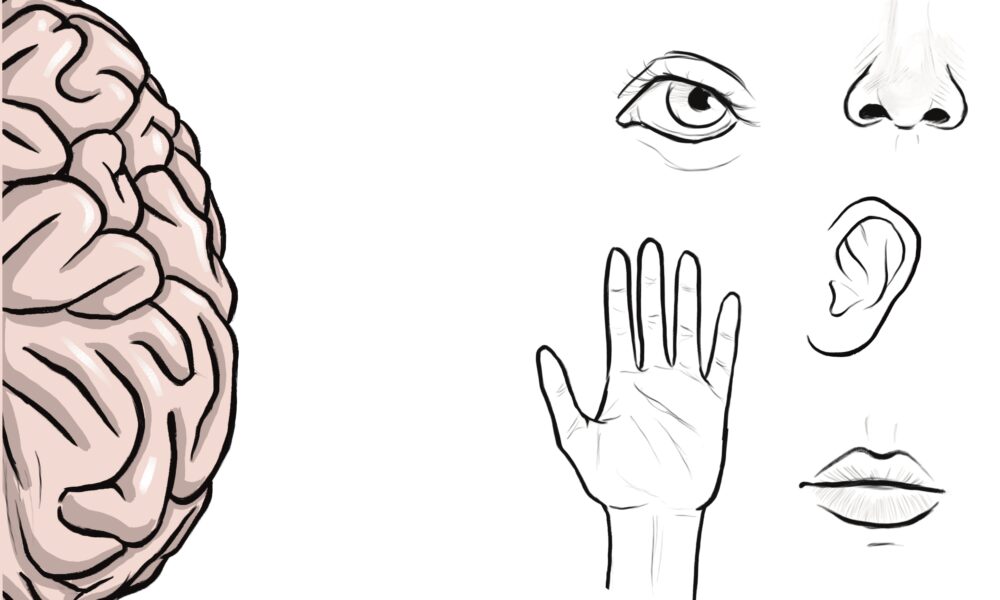If you are as curious as the rest of this Tribune special issue, then this article will hopefully answer some of your burning questions about two topics that merge neuroscience and student life seamlessly: Alcohol and human senses. In this second round of myth debunking in our Neuroscience myths and facts series, you will learn whether alcohol kills any of those brilliant neurons in your brain and whether humans only have five sensory faculties. So grab a beverage of your choice and read on about how all those 5 à 7 drinks at Gerts Bar & Café, Bar des Arts, or Blues Pub may be affecting your brain.
Does alcohol really kill the brain’s neurons?
Nuance is key when it comes to understanding the relationship between neuroscience and alcohol consumption. For starters, having a pint or two at Gerts after an exhausting exam or stressful altercation will not destroy any neurons. In fact, taking a break accompanied by any type of drink may have a positive effect on your brain and overall well-being. While some studies have shown that moderate drinking can negatively affect cognitive health, certain research suggests that responsible drinking might also have some cognitive benefits. This cohort study of 19,887 participants from the Health and Retirement Study (HRS) found that low to moderate drinking may contribute to higher cognitive abilities and lower rates of cognitive decline in middle to older aged adults. So contrary to the widespread myth that alcohol is a ‘neuron murderer,’ responsible drinking rarely leads to serious neurological damage as long as basic safety precautions are in place.
However, this myth requires extra nuance because excessive drinking can prove neurotoxic, meaning it has the potential to damage nerve cells in the brain. For example, excessive alcohol consumption—defined as five or more drinks on any day for men and four or more for women by the National Institute on Alcohol Abuse and Alcoholism (NIAAA)–may lead to neuronal cell death in specific brain regions, such as the hippocampus and the cerebral cortex. Chronic abuse can also pave the way for cognitive impairments affecting brain health over a longer period.
Do we only have five senses or are there more sensory faculties to uncover?
Without any particular nuance needed, one of alcohol’s well-known effects is its influence on the senses. Although the “five senses” model underlies the widespread belief that we have five senses—which is partly true—it is limiting and slightly biased against the rest of the human body’s sensory systems such as the vestibular system. This restrictive model includes only the familiar basics: Touch, sight, hearing, smell, and taste. But, humans can experience far richer sensory experiences and function in complex situations that engage other sensory systems. For instance, without our vestibular system and its sensory receptors called “hair cells,” we would have a much harder time maintaining our balance and not sliding down the icy McTavish street during the winter months.
Proprioception is another sense that often goes unnoticed when discussing human sensory faculties, despite its crucial role in providing us with body awareness. Without the proprioceptive system’s mechanoreceptors—sensory receptors located in joints, tendons, and muscles, students would find it extremely challenging to navigate the busy Schulich library flooded with other stressed-out McGillians and errant spinny chairs. By acknowledging and understanding these additional senses, we gain a deeper appreciation for the marvels of human perception.
Your weekly 5 à 7 are not killing your neurons, and you have more than five senses
Now that you know only excessive alcohol consumption can cause serious neurological damage, you can enjoy your next drink at peace without worrying about any of your neurons dying as long as you put safety and responsible drinking first. The SciTech team hopes that you can also further appreciate your body’s incredible sensory systems and their expansive functions, from balance to proprioception. Stay tuned for the next installment of this series next semester with myth-busting in the areas of memory, intelligence, and love through the neuroscience lens.






